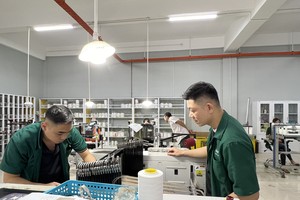Economists said Vietnam’s trade deficit was getting bigger as the domestic auxiliary industry remained fledging, with local businesses depending strongly on imported materials.

“The Ministry of Industry and Trade has issued a list of products that the government restricted importing. However, it is just one of the technical measures. We cannot narrow down the trade gap immediately as the domestic production still depends on imported materials,” said Deputy Minister Nguyen Thanh Bien of Industry and Trade.
Experts said beefing up export to reduce the trade deficit was among the country’s top priorities. However, the export sector is growing at slow pace due to many inadequacies.
“Crude oil and textile are among Vietnam’s key exported items. But local oil companies export crude oil only, which is directly exploited from nature and has low value,” said an economists in Ho Chi Minh City.
“Textile exporters earn less from the annual export turnover as they have nothing but the minor advantage of low-cost human resource, while most materials are imported from abroad,” he said.
Despite the export turnover significantly increasing 33.7 percent year-on-year to US$19.25 billion in the first quarter of the year, some local exporters’ sales declined due to high prices.
“The global consumption is switching to India and China, which have advantages of a huge population and stable economic growth rates. Therefore Vietnam’s export turnover from big markets is expected to grow slower in the upcoming time,” warned Dr. Tran Dinh Thien, head of the Vietnam Institution of Economics.
“Local exporters should maintain the business relations with traditional markets including the US and EU, as well as focus on seeking and boosting export into new potential markets,” Thien said.
Vietnam's trade deficit eased slightly in the first three months of 2011, official estimates showed last month, in a boost for the government as it battles to stabilize its economy, according to AFP.
The deficit is forecast at US$3.03 billion in the January-March period, against $3.43 billion for the same quarter last year, the General Statistics Office (GSO) said.
Compared with the first quarter of 2010 exports rose 33.7 percent to $19.25 billion, while imports gained 23.8 percent to $22.3 billion, the GSO said.
Last year's trade deficit was estimated at $12.4 billion and the government has set a target that this year's figure should not exceed 18 percent of export revenues.
"Things are on track and I think that we will be able to meet this target," Deputy Minister of Industry and Trade Nguyen Thanh Bien told Dow Jones Newswires.
The data come after the State Bank of Vietnam in February devalued the dong 9.3 percent in a bid to narrow the trade gap, while it has also increased interest rates to tame inflation, which is estimated to a two-year high 13.9 percent this month.
The fall in the trade deficit is "very small" and the impact of the devaluation – the largest in years – is not expected to be felt until later months, said Deepak Mishra, lead economist at the World Bank in Hanoi.
However, statistics show luxury goods import amounted to 40 percent out of the first-quarter trade gap in spite of the government’s instruction on restricting the trade deficit rate to below 16 percent this year.
The amount of the products, which are named among the government’s restricted import list, increased 4.8 percent year-on-year, worth $1.4 billion.
Dr. Vu Quoc Huy of the University of Economics in Hanoi said restricting luxury goods import will definitely narrow the trade gap.
























